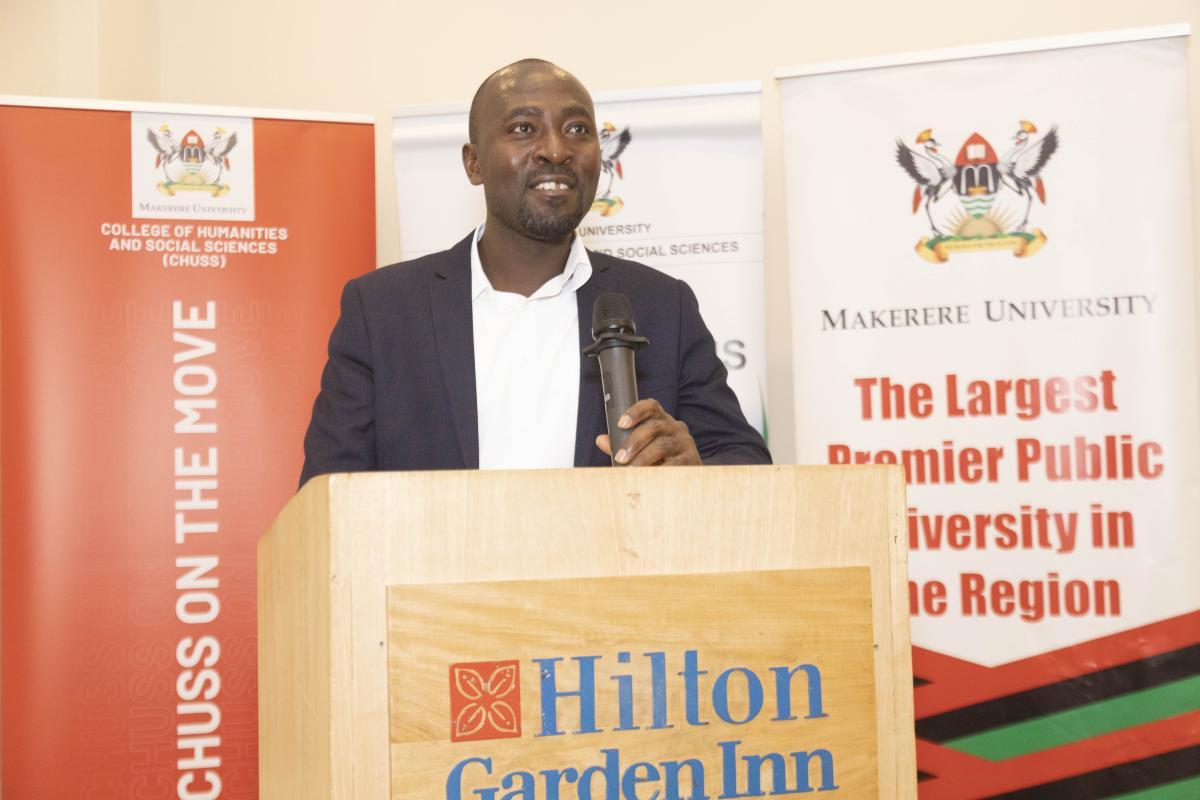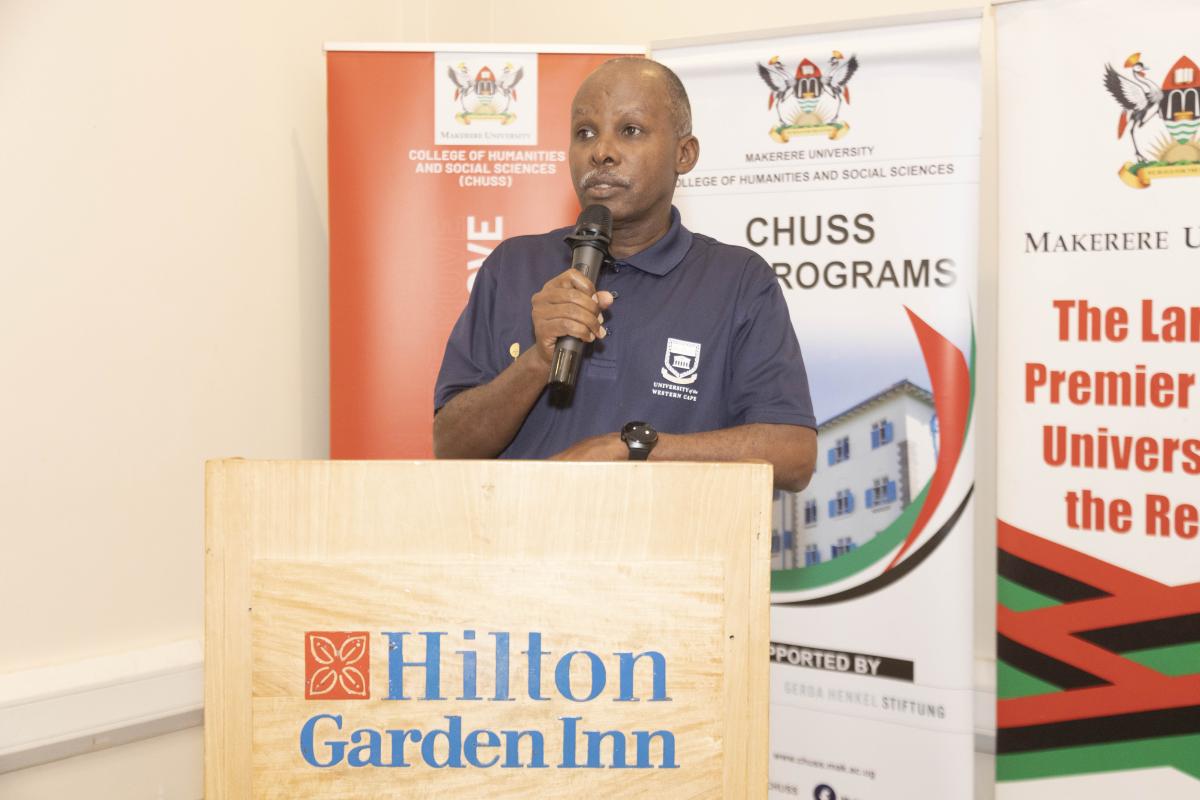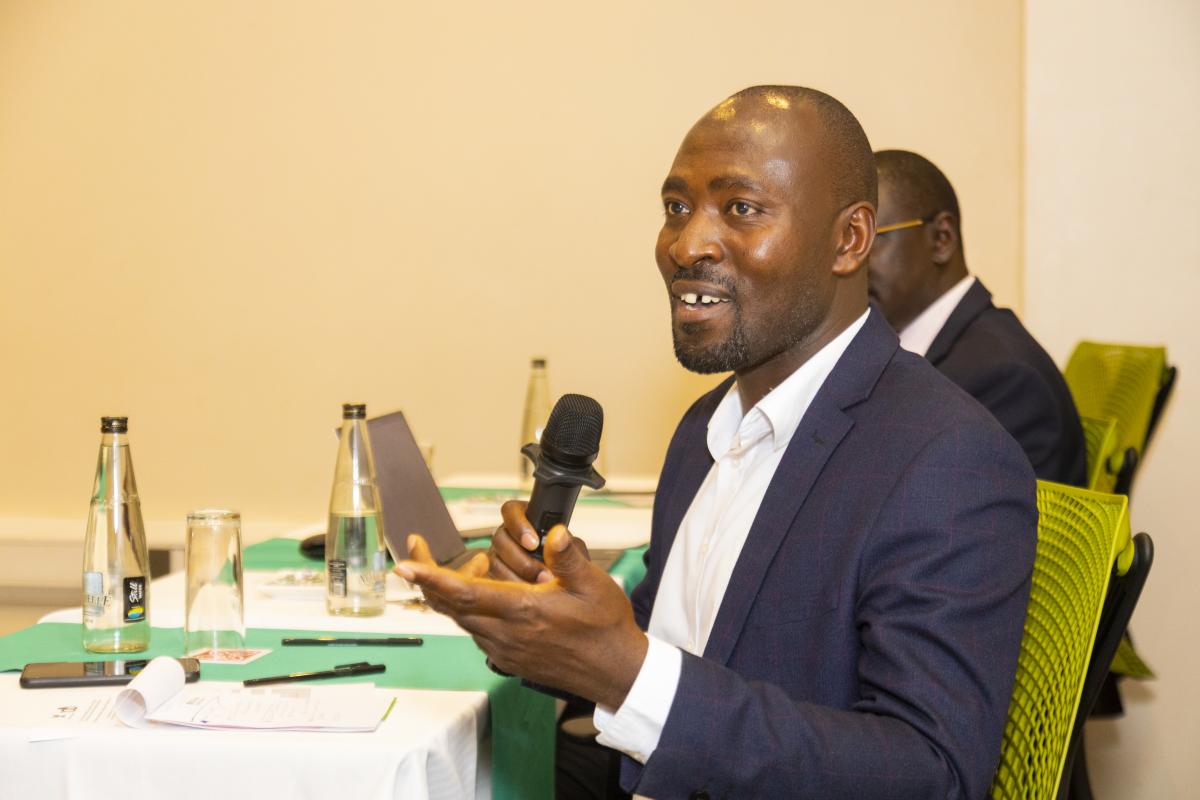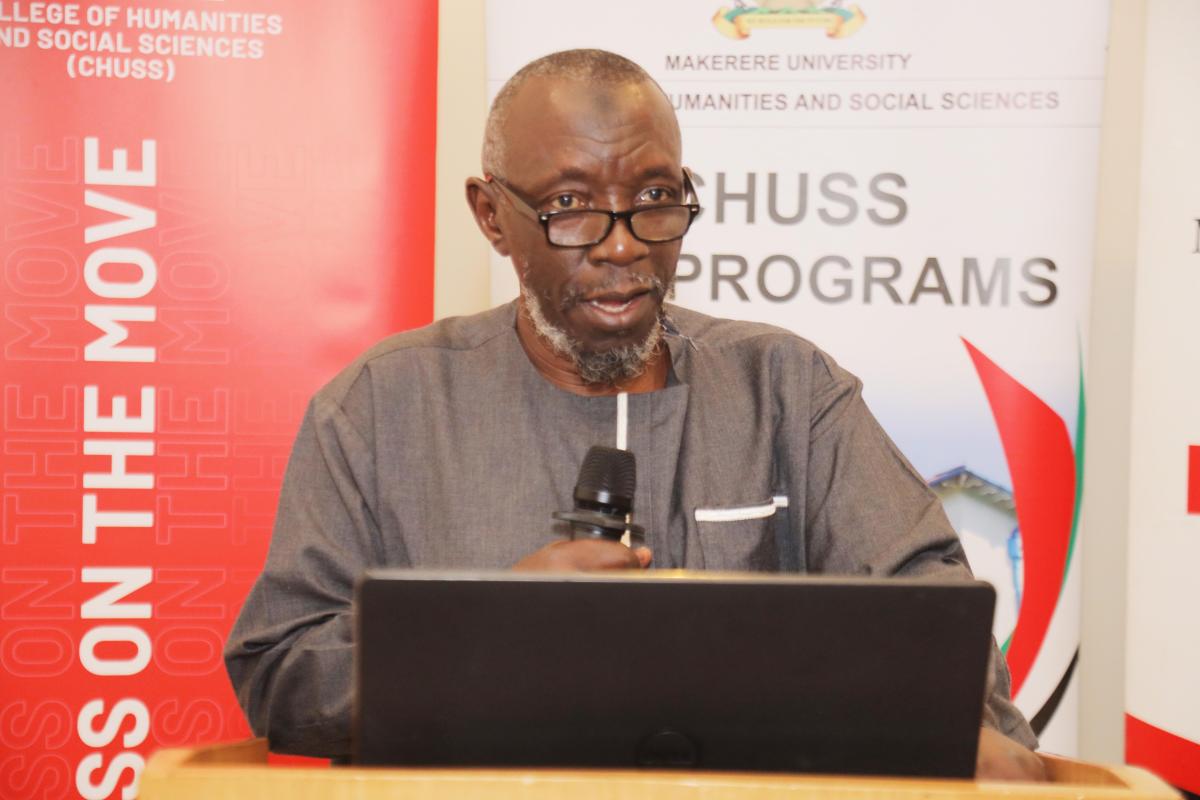
The College of Humanities and Social Sciences (CHUSS) at Makerere University opened a two-day seminar on September 26, 2024, aimed at improving graduate completion rates among PhD students. The event, held at the Garden Hilton Hotel, gathered new and old supervisors, deans, heads of departments, cordinators, registrars , support and administrative staff .
Dr. Cyprian Misinde, representing the Deputy Vice Chancellor for Academic Affairs, emphasized the importance of humility and teamwork among supervisors. "It's not only the supervisors; this is a whole package team," he said, highlighting the interconnected roles of faculty and administrative staff in student success. "When a graduate student is unhappy with any part of the academic process, it affects their relationship with supervisors."
Dr Cyprian Misinde representing the Deputy Vice Chancellor for Academic Affairs
Since 2017, CHUSS, in partnership with the Gerda Henkel Foundation, has been implementing a PhD training program. This year, the program admitted ten fellows. The seminar was aimed at sensitizing supervisors and all staff involved in the PhD process do a self-assessment, get new insights into supervision, and strategies to enhance the supervisory role within the college.
Misinde decried the low statistics on graduate completion rates. "If you look at the Makerere University statistics, about 50% of students complete their graduate training within three to four years," he stated. He urged supervisors to evaluate their methods, saying, "If your students are not completing in time, you need to evaluate yourself."
The two-day seminar will cover aspects including PhD training and approaches used in CHUSS, types of PhD supervision,ethical considerations in PhD research and the policies governing graduate training at Makerere University. Other aspects include supervisor- personal experience on PhD supervision and supervisee -personal experience on PhD supervision.
Misinde addressed the challenges students face, stating, that it is crucial for supervisors to be more engaged and responsive." He encouraged a culture of peer evaluation among faculty to improve supervisory practices. "It's a good practice to invite colleagues during supervision meetings to evaluate interactions with students," he suggested.
The seminar also aims to promote the internationalization of the university, which Misinde identified as essential for enhancing Makerere's global ranking. "Our ranking is affected by the number of international students. So any effort to bring onboard international students is a welcome," he remarked.
Principal CHUSS calls for re-assessment of policy on retention of PhD Staff
Dr. Martin Baluku, while representing the Principal of the College of Humanities and Social Sciences welcomed attendees to the retooling seminar for graduate supervisors, emphasizing the critical role of research in the university's mission. "We are moving towards a research-led university, and that means producing enough knowledge to develop our continent," he stated.
Dr Martin Baluku the Ag, Principal addressing participants at the Supervisors Retooling Seminar
Baluku highlighted the importance of PhD training as the cornerstone of research, noting that most research globally is conducted by PhD students and postdoctoral scholars. "As supervisors, we hold the mantle of the university’s mission. If we do our job well, our students will graduate and contribute to knowledge production," he said.
He advocated for retaining younger PhD supervisors, arguing that current retirement policies hinder potential contributions from experienced scholars. "We need to reassess our retirement policies. A scholar who graduates with a PhD at 50 shouldn't be told to retire at 60," he urged. "We must retain a critical mass of PhD supervisors to fulfill the university’s mission."
Baluku acknowledged the ongoing challenges with completion rates for PhD students, pointing out that many take significantly longer than the intended time frame. "We have students graduating beyond their study time. This is not acceptable," he remarked, urging supervisors to provide adequate time and support to all students.
As the seminar progressed, he expressed hope that participants would emerge with renewed skills to effectively guide their students. "Even as experienced scholars, we must continue learning," he concluded, thanking the organizers for the opportunity to retool and enhance supervisory practices.
Program Overview by Principal Investigator Dr. Levis Mugumya
Dr. Levis Mugumya provided an overview of the Gerda Henkel-funded program, which has been operational since 2017. He welcomed both new and old supervisors, emphasizing the program’s impact on the College of Humanities and Social Sciences. "This funding is crucial for addressing the deficit in humanities education," he stated.
Mugumya noted that the program has successfully attracted students from various African countries, including Uganda, Kenya, Tanzania, and beyond. "We are also looking to engage students from portugal and other countries," he added, highlighting the initiative's growth.
Dr. Levis Mugumya the project PI giving his opening remarks
He explained that the funding covers full tuition, stipends, laptops, and other support for students, facilitating their full-time study. "With over 200 applicants last year for just ten spots, this program has become highly competitive," he noted, indicating its popularity and the necessity for rigorous selection processes.
Mugumya encouraged new supervisors to meet with their students promptly to initiate the proposal development process, reiterating the importance of timely completion within the funded three-year program. He concluded by urging collaboration among faculty to ensure the success of their students, thanking everyone for their participation and support.
The College and PhD Training: The need to Enhance PhD Supervision Amidst Growing Demand
Dr. Martin Baluku addressed the significant strides made in PhD supervision within the College underscoring the critical role of effective supervision in improving graduation rates and enhancing the university's reputation.
.Dr. Baluku stressed the university's mission to transition into a research-led institution, noting the current availability of 139 postgraduate programs, which outnumber undergraduate offerings. Baluku also addressed the competitive landscape for graduate students, particularly as regional universities develop their own PhD capacities. He raised concerns about the potential loss of international students, particularly from Kenya, as their local institutions improve.
Dr Martin Baluku at the Seminar
To maintain its competitive edge, Dr. Baluku emphasized the need for Makerere to refine its value proposition in graduate training, focusing on quality and completion times. He urged supervisors to consider how they can enhance their contributions to the academic experience, particularly by fostering interdisciplinary collaboration.
The discussion also touched on systemic challenges faced by PhD students, including financial constraints, limited access to resources, and the need for supportive environments. Dr. Baluku pointed out that many students are self-sponsored and often struggle to fund essential academic activities, such as attending conferences.
In his conclusion, Dr. Baluku called for a collective effort among departments to strengthen PhD training at Makerere, advocating for more tailored curricula and improved supervision practices that aim to foster an academic culture that prioritizes student success and institutional excellence.
Task Committee Established to Revise Graduate Research Guidelines at CHUSS
Presenting on the approaches to Graduate Training in CHUSS, Prof. Abasi Kiyimba reported that the College launched a Task Committee aimed at revising guidelines for graduate research, chaired by Prof. Abasi Kiyimba himself. This initiative follows the college's notable achievements in graduate training, where it has consistently produced the highest number of PhD graduands among all university colleges.
At the May 2022 graduation ceremony, CHUSS conferred 25 PhDs, out of a total of 100 awarded university-wide. This marked the second consecutive year the college led in doctoral graduations, having previously awarded 22 PhDs in 2021.
Despite these accomplishments, there are concerns regarding the adequacy of current training practices. "While we have made significant strides, there is a sentiment that we can do better," stated Prof. Kiyimba. Key challenges identified include guidelines heavily influenced by natural sciences, lack of a specialized graduate training unit, and disparities in research practices among faculty and students.
Prof. Abasi Kiyimba giving a lecture at the CHUSS Retooling Seminar
The committee he said has focussed on several areas, including the development of research proposal formats and dissertation structures tailored for both Humanities and Social Sciences disciplines. It also addresses reference formats and scoring systems that reflect disciplinary differences within the college.
"This effort is crucial for empowering our students and supervisors to conduct research that aligns with the unique methodologies of their fields," noted Prof. Kiyimba.
The committee's preliminary findings suggest some gaps in research practices and knowledge among supervisors..
Recommendations from the committee aim to create a clear framework for graduate research that is both inclusive and compliant with international standards. Proposed measures include rigorous adherence to guidelines from the Directorate of Research and Graduate Training (DRGT) and ongoing training for supervisors to enhance their research oversight capabilities.
"Standardization may not be entirely feasible, but we can establish common practices that enhance order and clarity in our graduate training culture," concluded Prof. Kiyimba.
The committee's findings were submitted to the college board for onward submission and input for integration into the university's research guidelines, marking a significant step toward enhancing graduate education at Makerere University.
